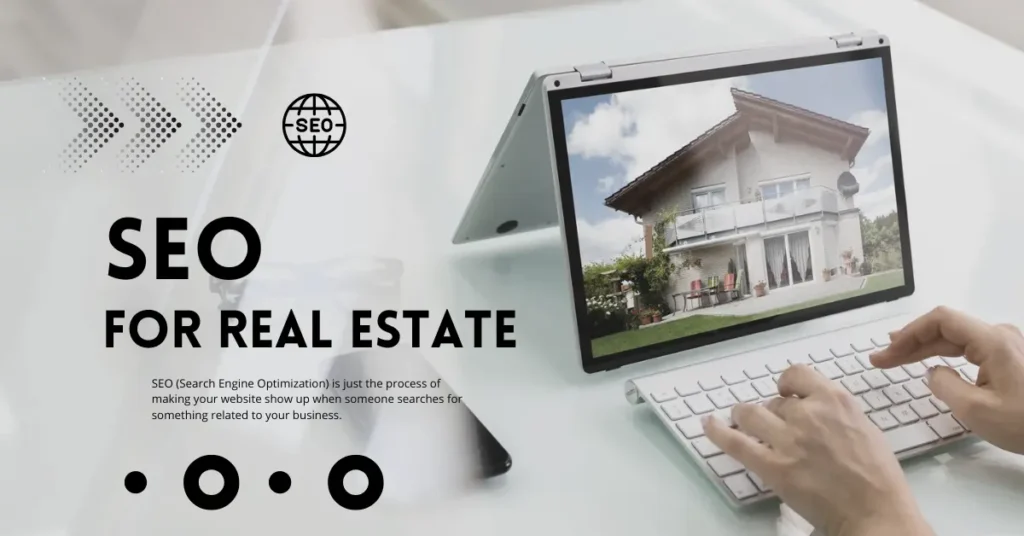Blog
How to Do SEO for a Real Estate Website (Without Losing Your Mind)

Real estate’s online battlefield
You ever feel like your website is just… floating out there in the void? Like you spent time, money, maybe even a little pride getting it built but it’s not bringing in much more than tumbleweeds? You’re not alone.
In real estate, the competition online is brutal. The big players (think Zillow, Realtor.com, Redfin) dominate the search results. Smaller, independent agencies often feel like they’re stuck watching from the sidelines. But here’s the thing:
You can absolutely compete.
You just need SEO that actually works for your market, your listings, your clients.
This isn’t about gaming the system or chasing algorithms. It’s about building a site that Google and your local buyers/sellers trust. And no you don’t need a massive team or agency budget to do it.
Let’s break it down.
So, what is SEO really doing for you?
Let’s strip the buzzwords. SEO (Search Engine Optimization) is just the process of making your website show up when someone searches for something related to your business.
Want to rank when someone types “homes for sale in Austin TX”? That’s SEO.
Want to show up when they Google “best realtor in Charlotte”? SEO again.
Want Google Maps to list your agency when buyers are nearby? Yep still SEO.
Think of it like this: Your website is your digital storefront. SEO is all the signage, lighting, and map pins pointing people to it.
Why real estate SEO is a beast of its own
Okay, now here’s where it gets a little tricky. Real estate isn’t like most industries. You’re not just selling a product you’re selling something deeply personal, expensive, and location-specific. And that throws a few curveballs.
Let’s unpack it:
-
Local intent is king: Buyers search near them or for a specific area (“condos in downtown Seattle”). So, general content won’t cut it.
-
Listings constantly change: Pages come and go as properties sell. That makes consistency hard—and Google doesn’t like dead ends.
-
It’s fiercely competitive: Major sites eat up the top rankings. So you have to be sharper, more local, and more human.
And let’s be real: results don’t happen overnight. It’s a slow burn but a worthwhile one.
The unsexy foundation: SEO setup that matters
Before writing a single word or keyword, you need a website that works well. Not just pretty functional.
Here’s what to check:
-
A solid CMS: WordPress is still the go-to for SEO-friendly sites. Wix and Squarespace are catching up, but WordPress gives you full control (especially with plugins like Rank Math or Yoast).
-
Mobile-first design: Over 80% of buyers browse listings on their phones. If your site’s clunky on mobile, you’re out.
-
Speed matters: Google hates slow sites. So do buyers. Tools like GTmetrix or Google PageSpeed Insights can help you figure out what’s slowing things down.
-
Secure and accessible: HTTPS isn’t optional anymore. And accessibility (like alt text for images) isn’t just nice it’s smart.
Keywords + content + local flavor = real estate SEO gold
You know your neighborhood better than anyone. Your SEO should reflect that.
Here’s how to make that work:
-
Start with keyword research: Use tools like Ubersuggest or Semrush. Think: “homes for sale in [your area],” “first-time buyer [city],” or “real estate agent near me.”
-
Focus on long-tail keywords: These are longer, more specific searches. Less competition, more qualified traffic. Example: “2-bedroom condos in Williamsburg under $500k.”
-
Create hyperlocal content:
-
Neighborhood guides
-
School district comparisons
-
“Moving to [City]? Here’s what you should know” posts
-
-
Optimize listing pages: Don’t just copy/paste MLS data. Add descriptions that highlight lifestyle perks (“walking distance to farmers market,” “sunset views from the balcony”).
-
Use internal links smartly: Connect related listings, blogs, and service pages. It keeps users on-site longer (which Google loves) and helps them find what they need faster.
Local SEO: Your not-so-secret weapon
If you ignore everything else don’t ignore this.
Local SEO is what gets you on Google Maps, in the “3-pack,” and in front of nearby leads. And guess what? Most real estate websites do this part badly.
Checklist time:
-
Google Business Profile: Claim it. Fill it out completely. Add weekly posts. Upload photos regularly.
-
NAP consistency: Your business Name, Address, and Phone must match exactly across your website, directories, and social media.
-
Local citations: Sites like Yelp, Zillow, Realtor.com, and your local Chamber of Commerce all count. The more legit mentions of your business online, the better.
-
Get reviews: Especially on Google. Politely ask happy clients. Respond to every review good or bad.
Technical SEO: Don’t panic
You don’t have to become a web developer but knowing the basics helps.
Here’s what to look at (or hand off to your web person):
-
XML sitemap: Think of it as a blueprint for Google’s bots. It helps them crawl your site efficiently.
-
Broken links: Use tools like Screaming Frog or Ahrefs to find and fix them.
-
Duplicate content: MLS feeds often duplicate listings. Use canonical tags to avoid penalties.
-
Schema markup: Especially for property listings, this adds structured data that tells Google what’s what (price, location, beds/baths).
Off-page SEO: Building digital street cre
Google needs to see that other people trust you too. That’s where backlinks come in.
Simple ways to get them:
-
Write guest posts for local blogs: “10 Things to Know Before Buying in [City]” makes a great pitch.
-
Partner up: Home stagers, mortgage brokers, landscapers all have websites. Ask if they’ll link to your services.
-
Sponsor local events or charities: Often gets you mentioned (and linked) on their sites.
-
Get featured in local media: Send pitches. Share market insights. Journalists love credible sources.
Tracking SEO without losing sleep
Let’s be honest: Analytics dashboards can be overwhelming. But you don’t need to monitor everything just the stuff that tells a real story.
Watch these:
-
Organic traffic: Are more people finding you via Google?
-
Keyword rankings: Are you moving up for the terms you care about?
-
Leads or conversions: Are form submissions or calls increasing?
-
Bounce rate/time on page: Are people actually reading your content?
Tools to use:
-
Google Analytics (free)
-
Google Search Console (free)
-
Rank Math (WordPress plugin)
-
BrightLocal (for local SEO tracking)
Mistakes that tank your SEO (and your leads)
Let’s nip these in the bud:
-
Keyword stuffing: Makes your content unreadable and Google penalizes it.
-
Ignoring mobile: We’ve said it before, but it’s that important.
-
No image optimization: Slow loading images are a killer. Compress and add alt text.
-
Low-quality content: AI generated fluff doesn’t work. Write like a human. Better yet, like you.
How long does this take, really?
Here’s the tough love part: Real estate SEO takes time.
It’s not instant think 3 to 6 months for early results, a year for meaningful traction.
But the ROI? Huge.
We’ve seen agents go from zero visibility to ranking for top local searches, getting free leads without paying for ads and closing more deals.
When should you hire help? If you’re too busy showing homes to blog or fix technical issues, it’s worth outsourcing. Just vet your SEO pros carefully ask for case studies, not just promises.
Final thoughts: Your website’s either working for you or against you
You’ve got the knowledge now. You don’t need to overhaul everything overnight. But you do need to start.
So pick one area: Maybe it’s rewriting a listing. Or claiming your Google Business Profile. Or fixing that sluggish mobile version.
SEO is a long game but in real estate, so is reputation. The sooner you start, the more doors it opens.
You know your market. Now, make sure your website does too.








